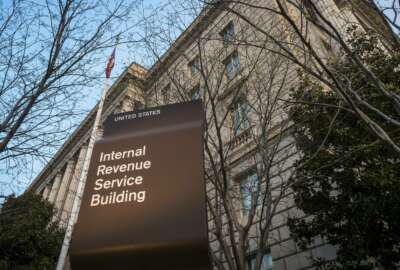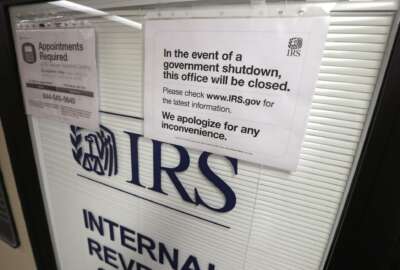

The administration’s first full budget request it released Friday would give the IRS $13.2 billion, a more than 10% increase for current levels.
The Biden administration is taking the first step in its multi-year plan to help the IRS dig out from a decade of budget and workforce cuts, starting with plans to significantly increase its IT modernization spending.
The administration’s first full budget request, released Friday, would give the IRS $13.2 billion — a more than 10% increase for current levels.
The request would grant $2.9 billion to taxpayer services, nearly a 15% increase from enacted levels and $5.5 billion to its enforcement division, or a 5% boost from enacted levels.
The budget also sets aside $305 million for the IRS to continue with its multi-year IT modernization plan, nearly a 35% increase from what Congress gave the agency in 2021.
The IRS, under this budget proposal, would also get $4.4 billion for infrastructure and operations support, which includes the IT and cybersecurity that keeps tax systems running.
The White House said the investments in the IRS IT modernization effort would help the agency better manage its caseload, increase the productivity of its workforce and ensure the security of taxpayer information.
“With improved online services, taxpayers will be able to receive notifications, check their account balance, set up payment plans, and connect with an IRS representative through a single, online session,” the administration budget states.
The Biden administration also proposes giving the IRS $7 billion in “program integrity activities” over the next decade that would improve the effectiveness of the IRS’s tax enforcement program.
Through these investments, the White House expects the IRS would recover an additional $50 billion in revenue over the same period. Overall, the administration estimates every additional dollar spent on the IRS would yield an $8 return on investment.
In return for this funding, the agency would have to give the House and Senate appropriations committees a quarterly update on IT modernization spending and progress made.
As with all presidential budgets, the Biden administration’s proposal requires buy-in from Congress, which remains wary of giving the IRS additional funding for IT modernization.
IRS Commissioner Chuck Rettig recently told members of the Senate Appropriations Committee the agency only received 55% of the funding it requested for its latest multi-year IT modernization effort. The agency, in some cases, has diverted funding from its enforcement operations to support long-deferred IT investments.
Despite these funding challenges, the IRS has made significant steps toward replacing its legacy IT infrastructure.
The IRS in 2020, according to the White House’s budget documents, cut the amount of legacy hardware still running on its network by half — down from 31% at the end of 2019 to 16% by the end of 2020.
These improvements include refreshing employee workstations, upgrading outdated server operating systems and phasing out old equipment.
Biden’s budget request would also give the IRS the resources it needs to staff up its offices.
The National Treasury Employees Union said the Biden administration’s plan would give the IRS enough funding to hire an additional 8,493 full-time employees.
“Rebuilding the IRS workforce after a decade of cuts is essential to making sure our tax code is enforced fully and fairly, and we will urge Congress to follow through on this proposal and help improve enforcement and customer service at the IRS,” NTEU President Tony Reardon said.
Professional Management Association President Chad Hooper, in a letter to House Appropriations Committee leadership, said adequate funding for the IRS “underpins every other policy object the Biden-Harris administration has proposed.”
However, Hooper said the budget plan doesn’t go far enough in proposing multi-year funding the IRS would need to pull off a long-term overall of its IT.
“After a decade of budget cuts, increased funding for the IRS is deeply appreciated. But Congress and the White House must realize it is not enough. We urge Congress to acknowledge the long-term needs of the IRS and provide multiyear budgets to truly address the needs of the Service,” Hooper said.
Rettig, however, warned the agency must also undergo “significant hiring” to get ahead of a projected 52,000 employees who will retire or otherwise leave the agency over the next six years.
The administration’s budget request for the IRS is part of a proposal to give the agency steady increases to its budget and workforce over the next decade, in order to counteract a decade of cuts.
The IRS has 33,000 fewer employees than it did in 2010, and about a 20% smaller budget than it had a decade ago.
A Treasury Department report released ahead of the budget proposal called for increasing the IRS workforce by a maximum of 15% each year for the next 10 years, with a focus on hiring enforcement and taxpayer service personnel.
The agency, under this plan, would also see its budget increase by about 10% year over year for the next decade.
The budget document also takes into account the scope of the IRS’ mission of getting COVID-19 stimulus money to taxpayers. The agency played a pivotal role in issuing hundreds of billions of dollars in Economic Impact Payments, and postponed 2020 and 2021 tax payment deadlines under a “People First Initiative.”
The pandemic also had a significant impact on IRS operations. The pandemic forced the agency to temporarily close Taxpayer Assistance Centers, giving taxpayers no face-to-face option for agency assistance, and had trouble staffing phone lines in the early stages of the pandemic.
As a result, the Biden budget notes the IRS saw a 146% increase in online services, compared to 2019 levels.
Copyright © 2024 Federal News Network. All rights reserved. This website is not intended for users located within the European Economic Area.
Jory Heckman is a reporter at Federal News Network covering U.S. Postal Service, IRS, big data and technology issues.
Follow @jheckmanWFED



